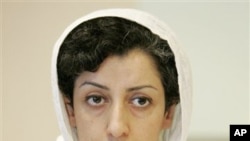The press freedom advocacy organization, The Committee to Protect Journalists, has called Iran “the world’s worst jailer” of journalists, with dozens behind bars. The Committee has also ranked Iran number four on its list of the most censored countries in the world. Now the Iranian regime has added to its discreditable reputation by summoning journalist and human rights defender Narges Mohammadi to prison.
Ms. Mohammadi, who has long championed women’s rights, was also a spokesperson for Nobel peace laureate Shirin Ebadi’s now-banned Center for Human Rights Defenders.
Originally arrested in June 2010, Ms. Mohammadi became seriously ill in prison after being held in solitary confinement, and was provisionally released in July 2010. In October 2011, she was sentenced to 11 years on charges of “collusion against national security,” “membership in the Defenders of Human Rights Center,” and “propagating against the regime.” The sentence was eventually reduced to six years, but she had remained out of prison while her case was on appeal.
At a recent press briefing, U.S. Under Secretary of State for Public Diplomacy Tara Sonenshine stressed the critical role of journalists and press freedom for healthy communities: “Media freedom is the moral equivalent of oxygen,” she said. “It is how society breathes, and it is a key pillar of building civil societies.”
Iran, like all countries around the world, needs that oxygen, and Iranian journalists and civil society activists, like Narges Mohammadi, are being suffocated for their efforts. Her plight and that of the dozens of other journalists languishing in Iranian prisoners demonstrate that journalism is, as Secretary of State Hillary Clinton has said, “the calling of everyday heroes.”
And the United States, said Secretary Clinton, “will continue to stand up for those who speak in perilous circumstances as they pursue, record and report the truth.”




